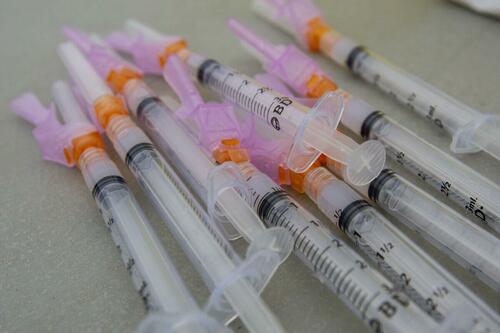
Authored by Zachary Stieber via The Epoch Times (emphasis ours),
A growing number of leprosy cases are being reported after COVID-19 vaccination, including two cases in the United Kingdom that researchers said may have been caused by the vaccines.

The researchers examined records from the Leprosy Clinic at the Hospital for Tropical Diseases in London. They found that of the 52 people who went to the clinic in 2021, at least 49 were vaccinated.
The study definition of a leprosy adverse event associated with a COVID-19 vaccine included developing leprosy or a leprosy reaction within 12 weeks of receiving a dose and the person having no previous history of leprosy or a leprosy reaction.
Two people met the case definition. One developed borderline tuberculoid (BT) leprosy one week after a second dose. The other experienced a reaction 56 days after a dose. Both doses were Pfizer’s BNT162b2 vaccine. Pfizer did not respond to a request for comment.
“The development of BT leprosy and a Type 1 reaction in another individual shortly after a dose of BNT162b2 vaccine may be associated with vaccine mediated T cell responses,” the researchers said.
The COVID-19 vaccines can provoke a response from white blood cells, or T cells. The cells are believed to protect against COVID-19.
T-cells can theoretically trigger Mycobacterium leprae, a bacteria that causes leprosy, leading to leprosy or a leprosy reaction, the researchers said.
Other vaccines have been shown to trigger leprosy or leprosy reactions, including tuberculosis vaccines, and some people who receive repeated COVID-19 vaccinations have been shown to have weakened immune systems.
The paper was published on Aug. 4 by PLOS Neglected Tropical Diseases.
More on Findings
The person diagnosed with leprosy is an 80-year-old man who has lived in the United Kingdom for 49 years. He suffered from symptoms including thickened nerves. The leprosy diagnosis was confirmed via skin biopsy. The man may be the first to acquire leprosy in the UK since 1954.
The man improved over time and actually received a third dose of Pfizer’s vaccine.
“Interestingly he had a third dose of BNT162b2 vaccine six months after the second dose having started anti-bacterial therapy and experienced no deterioration of his leprosy. The skin lesions and nerve thickening had resolved by the time he completed the six-month course of anti-microbial therapy. There had been no recurrence of the plaques or nerve signs after 12 months,” the researchers said.
The reaction was recorded in a 27-year-old man who had taken multidrug therapy, a drug for leprosy, in the past. He developed red plaques and thickened nerves before arriving in the UK from an unidentified country. A biopsy supported the diagnosis. He took medicine and the symptoms improved.
The link between the vaccine and the issue in the second case was strengthened by studies showing people who took the therapy three years or more years before are unlikely to experience a new reaction, the researchers said.
Of the 52 people who went to the Leprosy Clinic for diagnosis and/or treatment in 2021, all but two reported their vaccination status. Of those 50, 49 were vaccinated.
Five of the patients at the clinic were newly diagnosed with leprosy in 2021. Five others had a type one reaction. All were vaccinated, but just one of each category was determined to be possibly caused by a vaccine after being diagnosed within 12 weeks of vaccination. It was not clear when the other four were vaccinated.
Dr. Barbara de Barros, the study’s corresponding author, did not respond to a request for comment. The authors reported no funding or competing interests.
Dr. de Barros and the other UK researchers said that doctors should be aware that COVID-19 vaccination may cause leprosy but that they believe the benefits of COVID-19 vaccination “outweigh these unwanted events.” They provided no citations for the benefits of vaccination, which have dropped dramatically as newer variants have emerged and led to more nuanced recommendations in some countries. Citations for scope of harm included a 2021 recommendation from India that people with leprosy receive a COVID-19 vaccine.
Read more here...
Authored by Zachary Stieber via The Epoch Times (emphasis ours),
A growing number of leprosy cases are being reported after COVID-19 vaccination, including two cases in the United Kingdom that researchers said may have been caused by the vaccines.

The researchers examined records from the Leprosy Clinic at the Hospital for Tropical Diseases in London. They found that of the 52 people who went to the clinic in 2021, at least 49 were vaccinated.
The study definition of a leprosy adverse event associated with a COVID-19 vaccine included developing leprosy or a leprosy reaction within 12 weeks of receiving a dose and the person having no previous history of leprosy or a leprosy reaction.
Two people met the case definition. One developed borderline tuberculoid (BT) leprosy one week after a second dose. The other experienced a reaction 56 days after a dose. Both doses were Pfizer’s BNT162b2 vaccine. Pfizer did not respond to a request for comment.
“The development of BT leprosy and a Type 1 reaction in another individual shortly after a dose of BNT162b2 vaccine may be associated with vaccine mediated T cell responses,” the researchers said.
The COVID-19 vaccines can provoke a response from white blood cells, or T cells. The cells are believed to protect against COVID-19.
T-cells can theoretically trigger Mycobacterium leprae, a bacteria that causes leprosy, leading to leprosy or a leprosy reaction, the researchers said.
Other vaccines have been shown to trigger leprosy or leprosy reactions, including tuberculosis vaccines, and some people who receive repeated COVID-19 vaccinations have been shown to have weakened immune systems.
The paper was published on Aug. 4 by PLOS Neglected Tropical Diseases.
More on Findings
The person diagnosed with leprosy is an 80-year-old man who has lived in the United Kingdom for 49 years. He suffered from symptoms including thickened nerves. The leprosy diagnosis was confirmed via skin biopsy. The man may be the first to acquire leprosy in the UK since 1954.
The man improved over time and actually received a third dose of Pfizer’s vaccine.
“Interestingly he had a third dose of BNT162b2 vaccine six months after the second dose having started anti-bacterial therapy and experienced no deterioration of his leprosy. The skin lesions and nerve thickening had resolved by the time he completed the six-month course of anti-microbial therapy. There had been no recurrence of the plaques or nerve signs after 12 months,” the researchers said.
The reaction was recorded in a 27-year-old man who had taken multidrug therapy, a drug for leprosy, in the past. He developed red plaques and thickened nerves before arriving in the UK from an unidentified country. A biopsy supported the diagnosis. He took medicine and the symptoms improved.
The link between the vaccine and the issue in the second case was strengthened by studies showing people who took the therapy three years or more years before are unlikely to experience a new reaction, the researchers said.
Of the 52 people who went to the Leprosy Clinic for diagnosis and/or treatment in 2021, all but two reported their vaccination status. Of those 50, 49 were vaccinated.
Five of the patients at the clinic were newly diagnosed with leprosy in 2021. Five others had a type one reaction. All were vaccinated, but just one of each category was determined to be possibly caused by a vaccine after being diagnosed within 12 weeks of vaccination. It was not clear when the other four were vaccinated.
Dr. Barbara de Barros, the study’s corresponding author, did not respond to a request for comment. The authors reported no funding or competing interests.
Dr. de Barros and the other UK researchers said that doctors should be aware that COVID-19 vaccination may cause leprosy but that they believe the benefits of COVID-19 vaccination “outweigh these unwanted events.” They provided no citations for the benefits of vaccination, which have dropped dramatically as newer variants have emerged and led to more nuanced recommendations in some countries. Citations for scope of harm included a 2021 recommendation from India that people with leprosy receive a COVID-19 vaccine.
Read more here…
Loading…





